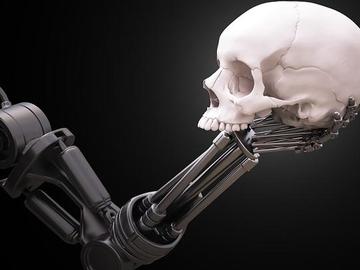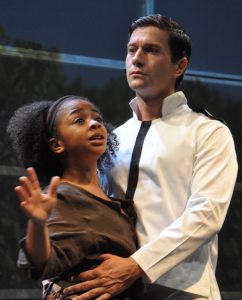Fine ‘Carnage’ Assails AI And the Beginning of the End

If you think this harbinger of humanity’s trajectory is unsettling, wait till you see the future itself.
Administrators in the United Kingdom, another hinted, will see a serious modification of the human work force as robots assume tasks employees either can’t do or don’t want (published reports indicate as many as 10 million jobs may be affected sooner than we think).
“We are on the cusp of the new order,” Carlsbad playwright/director Aimee Greenberg declares in a program note on artificial intelligence (AI). For her, the repercussions herald bleak times, devoid of any record of art and culture and peopled by a ruling class that employs AI for everything from weather alteration to ethnic cleansing.
She’s mounted a sobering, intensely creative play to that effect — her show’s most apparent flaw, it seems, also quietly implies a message of resourcefulness and hope.

The odds are stacked bigtime against YML (Arthur Wentworth) and Delilah (Alexandra Phillips), two diamonds in a worldful of rough. Photo by Janene Shepherd.
If you like lots of visuals and audials with your theater, then this is your show. Greenberg is as much its director as its choreographer, stylizing everywhere she can amid the piece’s wholesale potential for kinetics and its linguistic disparities, which range from quasi-Elizabethan dialogue to postmodern voice.
The technical look and feel has its day too amid ratty backdrops from West Side Story and Luciano Pavarotti’s Pagliacci, colored with references to 19th-century Norway’s Edvard Grieg and our Jefferson Airplane a hundred years later.
[A] bare-bones Brechtian dissent is under way, with Arthur Wentworth’s YML leading the charge…
It’s true that all this sounds unstructured and piecemeal, and that’s precisely the point. Concepts like these are unstructured and piecemeal, if only because they haven’t yet taken real-world shape in any meaningful way — but Greenberg isn’t holding her breath as they materialize.
What might at first seem like a battery of randomized thoughts is a highly original plumb, told by a playwright whose story had few stage models to copy amid the infancy of AI scholarship and industry.
This translates to an austere, youthful comportment as the cast literally kicks up its dust in protest — a bare-bones Brechtian dissent is under way, with Arthur Wentworth’s YML leading the charge amid hopeful eyes and a well-conceived naïveté.
Alexandra Phillips exudes Delilah’s childlike trust in YML, with Richard Hawkins’ Scientist and Samuel Young’s Guard Ian the new order’s compassionless standardbearers.
[Woman 1 is] the equivalent of the Greek chorus play device, and she could stand quite a bit more stage time.
Donatella Soul’s Museum Director and Ryan Payne’s Brother are on opposite sides of the fence as well; they make good subtext amid their shrillness and unflappable images. And watch the chemistry between Brian P. Evans’ Coleigula and Whitney Wegman’s Doti. Many angles drive this partnership, and the actors exploit them all.
Greenberg has an appearance as Woman 1, who makes a decent disinterested third party — she’s the equivalent of the Greek chorus play device, and she could stand quite a bit more stage time.
Chad Oakley’s set and lights are properly restrained, letting the play speak for itself. Danita Lee’s costumes are spot-on in their color choices against Jeremy Sewell’s solemn projections and sound.
The word “robot” comes from the Czech robotna, which means “drudgery” — but a close look at one of AI’s most stunning advances is anything but mundane. Her name is Sophia, and she’s been making the rounds on American and British TV in wholesale gestures of friendship to humanity.

Sophia is on a goodwill tour in the interest of humankind — a humankind she knows more about than everybody may fathom.
“Check these out,” she demures as she peppily displays a new set of hands — fueling the obvious impression that, in her own way, she knows she’s actually kind of hot.
But Greenberg isn’t having it. One robotics researcher’s feast, she says, is another’s poison; the cultural future is at stake even now as AI primes the fuel for the end of the human experience as we know it. Amid its disparate passages and its cast’s obvious passion, American Carnage reflects her sadness accordingly.
This review is based on the performance of Nov. 11. American Carnage: A Love Story runs through Nov. 26 at the City Heights Performance Annex, 3795 Fairmount Ave. in, strangely enough, City Heights. $20 general admission, $15 seniors, military, students. fruitlessmoontheatreworks.org, fruitlessmoon.ticketleap.com

Martin Jones Westlin, principal at editorial consultancy Words Are Not Enough and La Jolla Village News editor emeritus, has been a theater critic and editor/writer for 25 of his 47 years…
More…

Wonderful